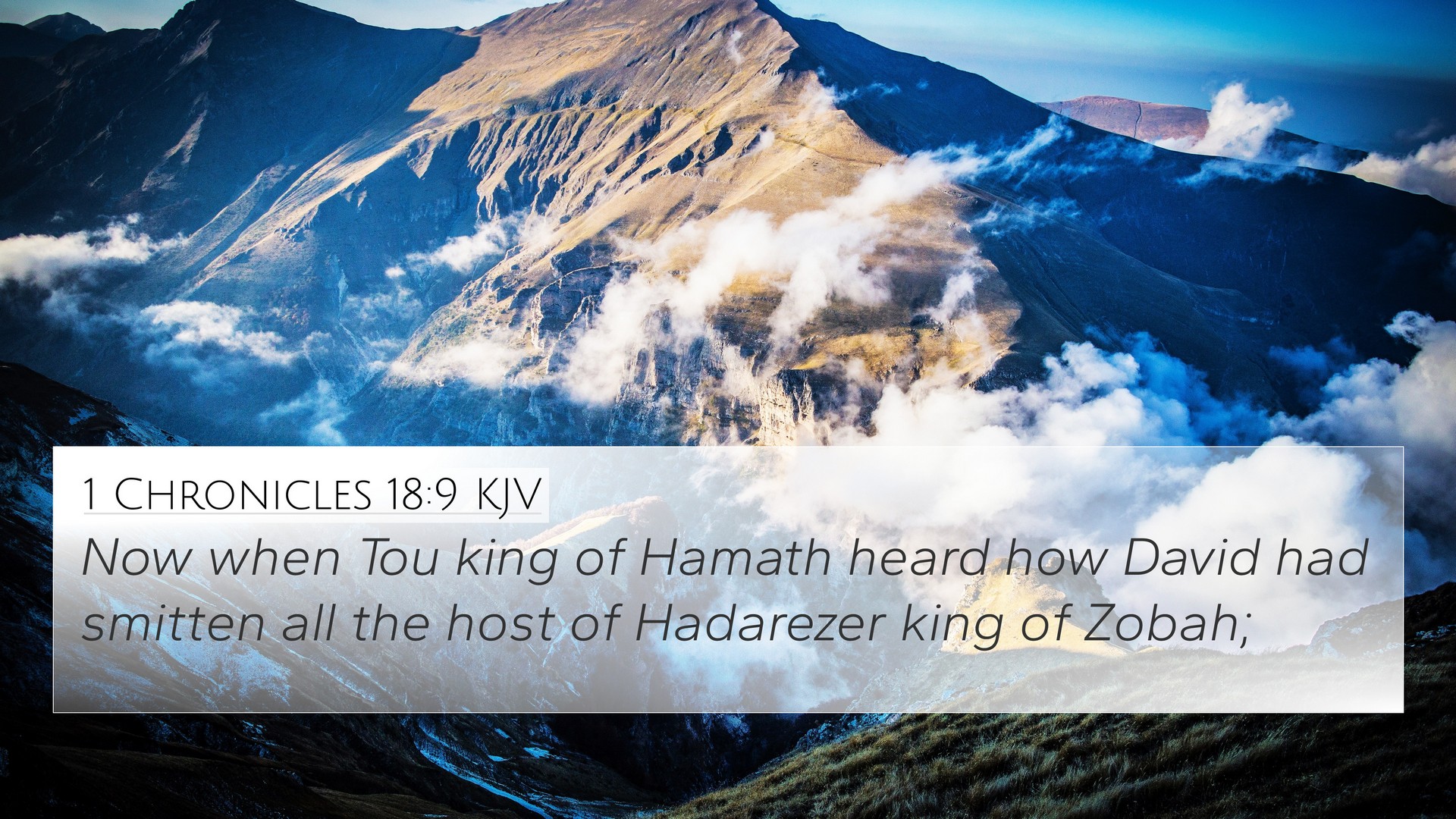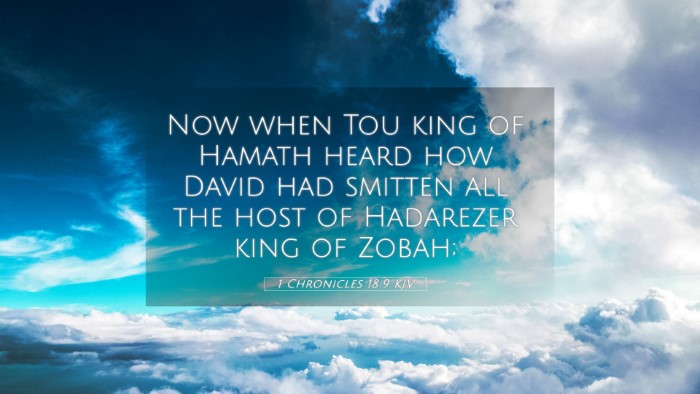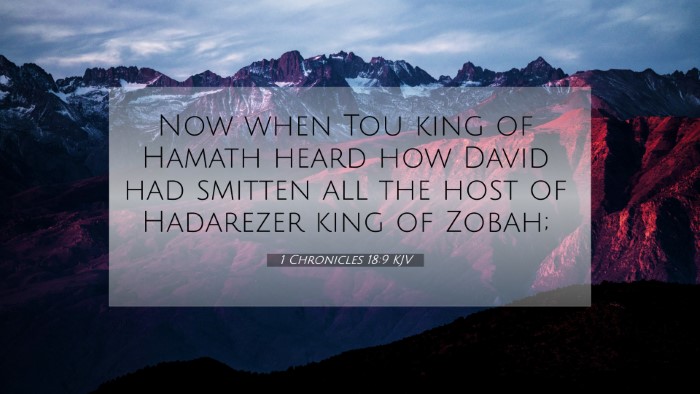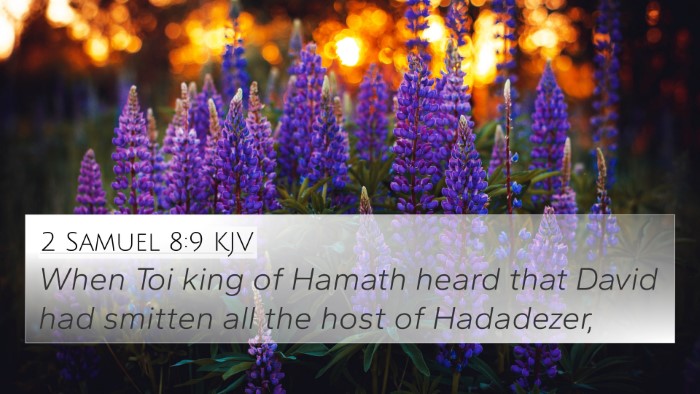Understanding 1 Chronicles 18:9: A Comprehensive Summary
Verse: 1 Chronicles 18:9 - "And when Tou king of Hamath heard how David had smitten all the host of the Syrians that were in the region of Zobah, he sent Hadoram his son to king David, to enquire of his welfare, and to congratulate him, because he had fought against Hadadezer and smitten him; for Hadadezer had wars with Tou. And he sent vessels of silver, and vessels of gold, and vessels of brass;"
Context and Background
This verse situates itself in a significant period of David's reign as King of Israel. At this time, David was consolidating his power and extending Israel's borders through military victories. The context shows the geopolitical dynamics of the region, where alliances and enmities were common.
Key Themes
- Recognition of Power: The verse illustrates how David's military successes had garnered attention from neighboring kings.
- Diplomatic Relations: King Tou of Hamath reaching out to David signifies a shift towards diplomacy following conflict.
- Gifts as Symbols of Alliance: The vessels of silver, gold, and brass sent by Hadoram represent both gratitude and a form of alliance.
Commentary Insights
Matthew Henry: Henry emphasizes that this event exemplifies the respect and fear that David inspired in neighboring realms. It highlights the fulfillment of God's promise to make David's name great, as seen in the blessings from other kings.
Albert Barnes: Barnes draws attention to the importance of Tu's actions, noting that even enemies acknowledge David's might. The gifts reflect both a congratulation and a desire for peace, suggesting a transition from conflict to diplomacy.
Adam Clarke: Clarke suggests that the sending of gifts not only showcases Tou's appreciation but also serves to strengthen his own position. In ancient contexts, such gestures were common as kings sought to align themselves with powerful neighbors.
Cross-References to 1 Chronicles 18:9
This passage resonates with several other biblical verses, illustrating inter-biblical connections:
- 2 Samuel 8:9-10: A parallel narrative detailing similar events where David's victories elicit responses from surrounding kings.
- Psalm 72:10: Rich tribute is paid to the king, affirming the expected tribute from foreign rulers.
- Isaiah 9:1: A prophetic commentary reflecting on Israel's dominance over its foes, linking back to David’s victories.
- 1 Kings 10:1: The Queen of Sheba's visit is another example of foreign recognition of Israel's might, creating thematic ties to David's reign.
- 2 Samuel 10:1-2: Discusses the ongoing conflicts with the Ammonites, demonstrating the military context leading up to this verse.
- 1 Chronicles 14:17: Highlights David's growing reputation, affirming the respect he holds among other nations.
- Ezekiel 38:1-2: Addresses the future recognition of Israel, linking past successes like those of David to later prophetic visions.
Connections Between Bible Verses
The themes presented in 1 Chronicles 18:9 resonate throughout Scripture, offering a broader understanding of God’s dealings with nations. The recognition of David's victories highlights:
- The importance of foreign recognition in affirming God’s chosen leaders.
- How military success served as a determinant for establishing peace and alliances.
- David's role as a type of Christ, anointed and recognized by God, drawing parallels to New Testament acknowledgments of Christ's lordship.
Inter-Biblical Dialogue and Thematic Connections
The interactions between David and Tou establish a pattern that echoes throughout the biblical narrative. Various passages reflect upon the nature of kingship, power dynamics, and the acknowledgment of God’s chosen instruments:
- Daniel 2:21: God’s sovereignty in raising kings parallels David's rise and the acknowledgment he receives.
- Matthew 2:1-2: The Magi recognize Jesus as a king, similar to how Tou recognizes David’s authority.
Conclusion
1 Chronicles 18:9 encapsulates themes of power, recognition, and the intricate dance of diplomacy following military victories. The insights from public domain commentaries together with the cross-references provide a rich tapestry for understanding the implications of David's rule and the nature of God's plans for His people. The verse invites us to explore the broader narrative of Scripture, encouraging deeper thematic studies and comparative analyses across both the Old and New Testaments. Like David, we are called to recognize God’s hand in our lives and acknowledge His sovereignty in establishing peace and goodwill among nations.



